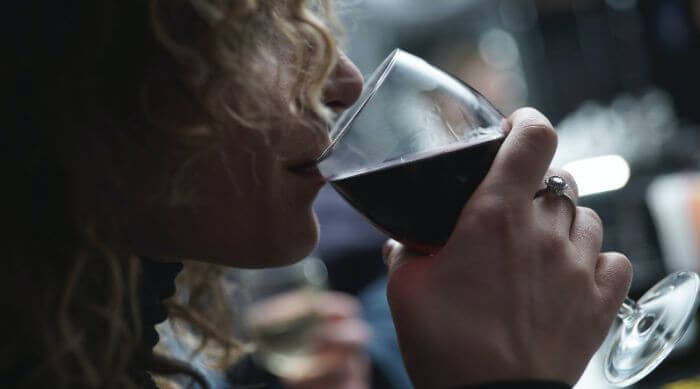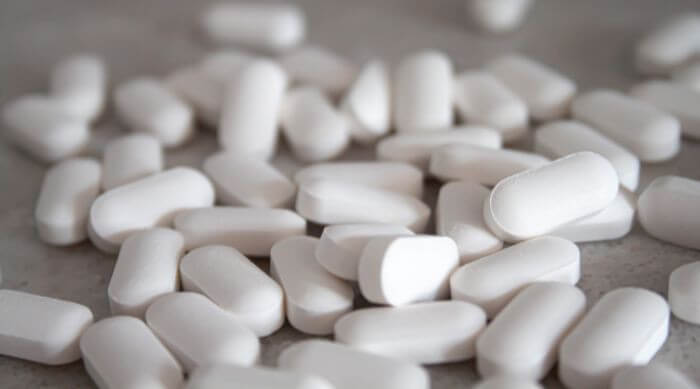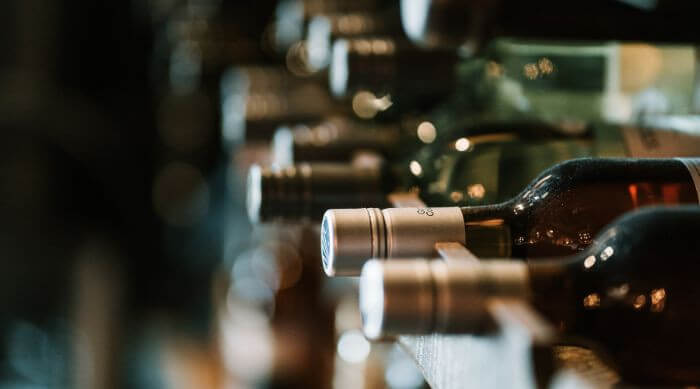Sipping on a glass of rich Cabernet Sauvignon or crisp Chardonnay can be a great way to unwind. But if you're following a gluten-free diet, you may wonder if that glass will come with regret.
Table of Contents
Fining Wine Can Leave Traces of Gluten in the Wine
Aging and Storing Wine May Lead To Gluten Contamination
Wine Coolers May Come With Gluten Risks
Is there gluten in wine?
No, there is not gluten in wine. Most wines are naturally gluten-free, but there are some exceptions.
In general, all wine, whether it's red, white, or rosé, is considered naturally gluten-free. This is because it's primarily made from grapes — a gluten-free fruit. However, complexities in the winemaking process may introduce the possibility of gluten contamination, albeit minimal.
Most types of wines, including sparkling wine and champagne, are made from grapes, a naturally gluten-free ingredient. During fermentation, yeast converts the sugars in grape juice into alcohol, producing a naturally gluten-free beverage.
Gluten, a protein found in wheat, rye, barley, and blends of those grains, is typically not found in any measurable quantity in wine. However, in rare cases, trace amounts of gluten can sneak into a bottle of wine due to cross-contamination.
You’ll want to be careful with any wines considered dessert wines, wine coolers, and even what you’re putting in your mocktails. Flavorings, coloring, and other additives to make these options more appealing can contain trace amounts of gluten.
Can you drink wine if you are gluten intolerant? Wine is generally considered safe for those with gluten intolerance. If you suffer from a more severe gluten allergy or celiac disease, you may still feel the effects of gluten if cross-contamination occurs during aging or storage. It is important to read wine labeling carefully or check with winemakers and vintners at a winery.
Does any wine contain gluten? There is no gluten in any wine grapes or in the fermentation process. Both red wine and white wine are gluten-free beverages. However, wine may be contaminated with gluten during the fining process, from additives, or due to certain storage methods.
Is non-alcoholic wine gluten-free? Yes! Non-alcoholic wines like Surely’s Bubbly Red are also gluten-free.
What is “gluten-free?”
The standard for gluten-free food and beverages is set by the Food and Drug Administration (FDA) at 20 parts per million (ppm), or 0.002%. This means any food or beverage products containing more than 20ppm is not gluten-free.
This measurement is used as a guideline by the Alcohol and Tobacco Tax and Trade Bureau (TTB) and the organization Gluten Free Watchdog. This organization seeks to boost brand transparency around the cross-contamination of gluten in the marketplace.
Fining Wine Can Leave Traces of Gluten in the Wine
Cross-contamination of gluten can happen during the fining process, part of the winemaking process. If gluten-containing fining agents are used, trace amounts of gluten could remain in the wine. However, any amounts typically fall below the FDA-defined limit for gluten-free labeling.
During fining, wine is clarified by removing unwanted substances. Fining a wine makes it clear and more palatable. Winemakers don’t want any visible particles floating around in the end result.
Usually, fining is done using gluten-free methods. Egg whites, gelatin, bentonite clay, and fish proteins are all common ingredients in the fining process. But some gluten-containing fining agents are used from time to time.
Wine lovers with other allergies should be just as cautious when choosing their wines as those with gluten sensitivities. Trace amounts of triggering allergens can cause issues for some people.
For example, fish proteins are also used for fining, and for someone with dietary restrictions or a seafood allergy, that could prove problematic. Most high-quality wines are not using these ingredients.
If you find yourself having a reaction while drinking wine, be aware that there is also the risk of sulfite allergies and tannin sensitivities. Alcohol in general can also increase gut inflammation and exacerbate symptoms of IBS.
Aging and Storing Wine May Lead To Gluten Contamination
Cross-contamination may also occur during the aging process, particularly if you store wine in oak barrels sealed with wheat paste. This method of aging wine is now seldom used.
Winemakers responded to consumers worried about their gluten consumption by adopting substitutes like paraffin wax instead. Even with flour paste seals, though, the levels are likely between 5 to 10 ppm, which is well below what the FDA considers gluten-free.
Gluten Free Watchdog agrees, pointing to the fact that through fermentation, those trace amounts of gluten are further broken down in the winemaking process. That all said, it’s still unlikely that even someone with celiac disease would react to those trace levels of gluten used in this kind of storage (though not impossible).
What is the best way to store wine to avoid gluten contamination? To avoid gluten contamination, the best way for winemakers to store wine is by using stainless steel tanks for their wine aging and storage.
This way, whether you’re drinking a fruity pinot noir or your favorite white wines, it’s unlikely that you’ll have an issue with any effects of gluten.
The same can’t be said about wine-style products, though.
Wine Coolers May Come With Gluten Risks
Many wines are safe to drink for those with non-celiac gluten sensitivity, but that does not mean wine coolers are allergen-free. These alcoholic beverages are marketed as wine products, but the additional ingredients may not be as safe.
Any wine products with added flavoring, color, or other additives may contain levels of gluten significant enough to cause problems for those with a sensitivity. That includes wine coolers, flavored wines, and even some dessert wines.
Check labels carefully before consuming any wine product that’s not just a straight bottle of wine.
Some wine coolers contain barley malt, for example, an ingredient that by definition contains gluten. That means they’re more in the malt beverages category than wine. Anything with “malt” in the name likely contains gluten and should be avoided if you’re watching your gluten content.
Can You Drink Wine if You Have Celiac Disease?
Wine is OK with celiac disease, but we recommend checking with the winery or looking for certified gluten-free labeling just to be sure.
Because the primary treatment for celiac disease is a strict diet of no gluten, if you don’t see that gluten-free label, it’s important to consider the potential for contaminants from storing and aging the wine.
That also means no bread and no beer for celiacs, including non-alcoholic beer. If wine is not your drink, gluten-free beers and other spirits like tequila are out there, but like wines, you just need to read labels carefully to look for additives.
Celiac disease is an autoimmune disorder where the ingestion of gluten leads to damage in the small intestine. For individuals with celiac disease, even trace amounts of gluten can trigger uncomfortable symptoms.
Any intestinal damage can mean your body isn’t absorbing nutrients as it should, leading to problems in your gut and digestive system. Untreated celiac disease has been linked to anemia, lactose intolerance, and even other autoimmune disorders caused by mineral and vitamin deficiencies.
To get to the bottom of any possible cross-contaminants, use the checklist below.
Gluten-Free Wine Checklist
If you watch your gluten intake or are looking to cut gluten out of your diet for weight loss or other reasons, first ask these questions about what you’re drinking:
- Does the label say the beverage is gluten-free? This one sounds simple, but it should be your first step in determining whether what you’re drinking is safe for you. This is particularly important with products like wine coolers.
- Is this wine tank-fermented? That would mean the wine is fermented in stainless steel tanks rather than oak barrels. While wheat gluten is rare in wine sealing these days, this is where it could appear if it was used.
- What does this wine brand use to filter its wine? If you’re worried about any other allergens on top of gluten sensitivity, this question is even more critical.
- Have you had this wine before? If you’ve found a wine you enjoyed with no adverse effects after indulging, it may be best to stick with that wine.
If you’re drinking what you believe to be gluten-free wine and still having issues, it may be another allergen in the wine.
The problem could be sulfites in the wine causing stomach distress or high levels of tannins triggering a headache. Another consideration is products used in the fining process may be on your list of food allergies.
What are some gluten-free wines? Gluten-free wine brands that explicitly state they are gluten-free include:
- Radius
- Inkarri Wines
- Surely
- Cupcake Vineyard
If a wine isn’t labeled as gluten-free, that doesn’t mean they’re unsafe, though. Most wines are naturally gluten-free.
The bottom line: It’s essential to know what you’re consuming, even if you’ve never had any issues with wine before. Not all wines are created equal, and some adults develop gluten sensitivities later in life.
That’s why we recommend high-quality wines without potential health hazards like gluten or alcohol.
Great Tasting Gluten-Free Wine
Remember that a gluten-free or alcohol-free label doesn't equate to a compromise in taste. There are delicious wines out there known for being completely gluten-free, wines that are alcohol-free, and then there is Surely, which is all of the above.
If you’re watching your wine calories, seeking pregnancy-safe beverages, or just wanting to cut back on the alcohol, then gluten-free and alcohol-free Surely is a great option to accompany your next dinner or girls’ brunch!
Surely is naturally gluten-free, made in the same way as your favorite wines, just without the alcohol. Try our sparkling rosé or sparkling white wine. Treat yourself today with a yummy glass of Surely.




